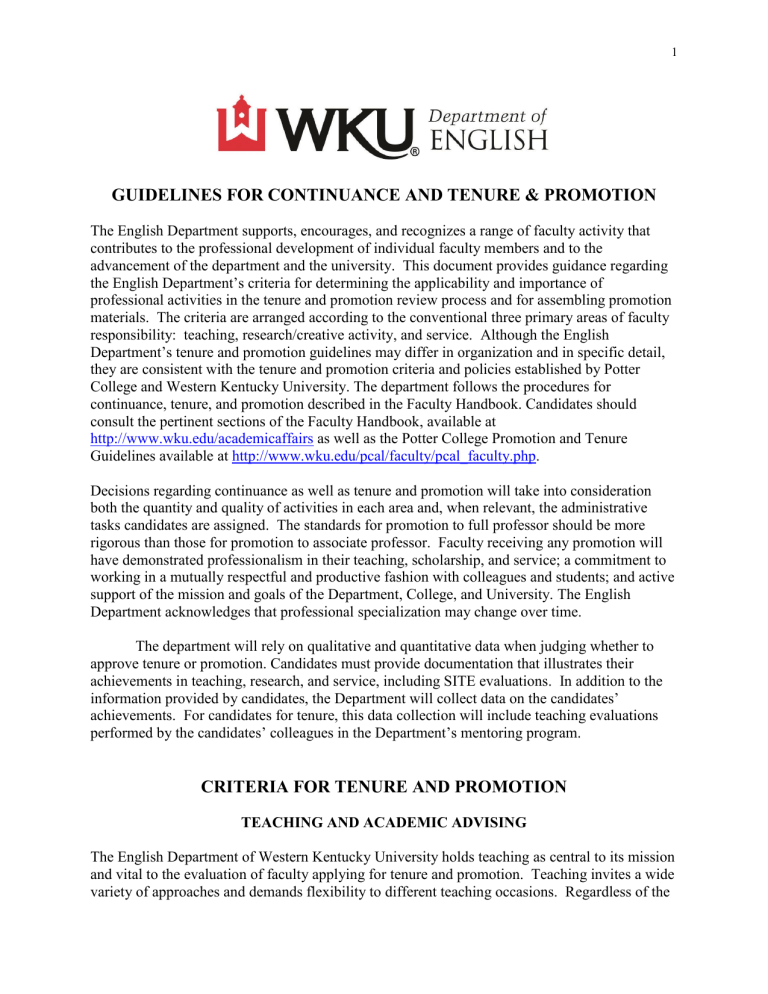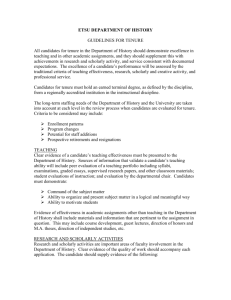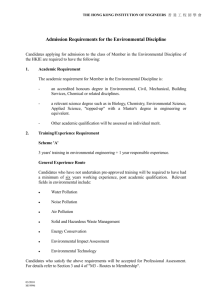GUIDELINES FOR CONTINUANCE AND TENURE & PROMOTION

1
GUIDELINES FOR CONTINUANCE AND TENURE & PROMOTION
The English Department supports, encourages, and recognizes a range of faculty activity that contributes to the professional development of individual faculty members and to the advancement of the department and the university. This document provides guidance regarding the English Department’s criteria for determining the applicability and importance of professional activities in the tenure and promotion review process and for assembling promotion materials. The criteria are arranged according to the conventional three primary areas of faculty responsibility: teaching, research/creative activity, and service. Although the English
Department’s tenure and promotion guidelines may differ in organization and in specific detail, they are consistent with the tenure and promotion criteria and policies established by Potter
College and Western Kentucky University. The department follows the procedures for continuance, tenure, and promotion described in the Faculty Handbook. Candidates should consult the pertinent sections of the Faculty Handbook, available at http://www.wku.edu/academicaffairs as well as the Potter College Promotion and Tenure
Guidelines available at http://www.wku.edu/pcal/faculty/pcal_faculty.php
.
Decisions regarding continuance as well as tenure and promotion will take into consideration both the quantity and quality of activities in each area and, when relevant, the administrative tasks candidates are assigned. The standards for promotion to full professor should be more rigorous than those for promotion to associate professor. Faculty receiving any promotion will have demonstrated professionalism in their teaching, scholarship, and service; a commitment to working in a mutually respectful and productive fashion with colleagues and students; and active support of the mission and goals of the Department, College, and University. The English
Department acknowledges that professional specialization may change over time.
The department will rely on qualitative and quantitative data when judging whether to approve tenure or promotion. Candidates must provide documentation that illustrates their achievements in teaching, research, and service, including SITE evaluations. In addition to the information provided by candidates, the Department will collect data on the candidates’ achievements. For candidates for tenure, this data collection will include teaching evaluations performed by the candidates’ colleagues in the Department’s mentoring program.
CRITERIA FOR TENURE AND PROMOTION
TEACHING AND ACADEMIC ADVISING
The English Department of Western Kentucky University holds teaching as central to its mission and vital to the evaluation of faculty applying for tenure and promotion. Teaching invites a wide variety of approaches and demands flexibility to different teaching occasions. Regardless of the
2 approach, the Department expects care and attention to teaching at all levels, from required general education classes to graduate seminars.
We recognize that many activities and elements that fall under the heading of teaching expand beyond the traditional classroom, including (but not limited to) availability to students outside the classroom, formal and informal mentoring of students on academic matters, and organizing or participating in student engagement activities such as field trips, conferences, and student clubs/organizations. We further recognize that many activities that may fall under the heading of service or research/creative activity have a direct bearing on teaching.
We also recognize that new technologies have created opportunities inside and outside the classroom to improve student learning. The department values innovative and successful teaching in both traditional and technologically enhanced classes.
To evaluate teaching effectiveness, the Department will rely on evaluations of teaching by colleagues in the Department, student feedback, and data submitted by the candidate.
Evidence relevant (but not exclusive) to Teaching and Advising include:
Classroom performance as demonstrated by formal student evaluations, peer review, video recordings, and/or teaching materials (syllabi, assignments, etc.)
Awards, recognitions, and honors for outstanding teaching
Course development and revision
Planning and teaching study abroad and Honors courses
Leadership of and participation in pedagogical seminars or workshops
Student engagement activities relevant to student learning
Direct supervision of student work of special merit (e.g. student work accepted for conferences or publication)
Supervision of theses, independent studies, and directed writings
Guest lectures, team-teaching, or other collaborative pedagogical efforts
Innovative or outstanding contribution to the assessment of teaching
Innovative or outstanding use of technology in teaching
Integration of current developments in the scholarship of teaching or in the instructor’s field of expertise into the classroom
Presentations at campus or community events that are relevant to teaching and/or involve instruction
Working with students to present papers, revise for publication, and in general to prepare for professional responsibilities
Dependable student advising on curricular and professional matters
The Department will evaluate teaching effectiveness according to the following criteria:
A. Effective course design and structure. Faculty members must create course syllabi that include assignments and required readings, dates of examinations, office hours, and a formula for assigning grades. Courses must be designed to deliver content effectively; to foster critical thinking, careful reading, and effective writing; and to encourage student learning in general.
3
B. Effective delivery of content. Faculty members must demonstrate that they have a command of the subject matter they teach, are effective communicators in the classroom, and are responsive to their students’ needs and feedback. The Department encourages the use of educational technologies to improve teaching and learning.
C. Rigor and consistency in grading. Faculty members must assign grades in ways that maintain high standards of academic excellence and encourage student learning. Grade distributions should approximate departmental averages in similar courses (i.e., linguistics, professional writing) at similar levels (i.e., 100, 200, 300). Candidates are encouraged to articulate a grading philosophy and comment on how their grade distributions reflect challenging coursework that encourages student learning.
D. Generally positive student feedback. Generally positive student feedback is an important indication of effective teaching and learning. Student feedback will be taken from the standardized SITE evaluations administered at the end of each semester. Faculty may choose to provide supplemental student feedback using their own instruments. Faculty members should demonstrate responsiveness to student feedback as they revise and improve their courses over time. SITE evaluation data will be considered in the context of other materials submitted by the candidate and the teaching evaluations/observations performed by Department colleagues.
E. Student Research. Faculty members are encouraged to provide our students with opportunities in collaborative research/scholarship. These activities may include guiding a student’s research in order to present a paper at a conference, helping a student develop a project that will fulfill the university’s expectations for public service, or allowing a student an opportunity to participate in a faculty research project.
F. Helping students succeed through effective mentoring. While the department has chosen to delegate the majority of advising to several faculty members, all English faculty are expected to be generally familiar with University, College, and Departmental requirements and be able to provide accurate and helpful advice to our students or direct students to appropriate advisors when necessary. In addition, faculty members are expected to provide the necessary mentoring and professional advice that will help our students to identify and achieve appropriate goals .
G. Extraordinary contributions to teaching or learning. Special consideration will be given by the Department to any extraordinary contributions to improving the quality of teaching/learning or course/program offerings in the Department or the University, including organizing teaching colloquia, creating and implementing innovative courses or programs of study, serving as teaching mentors, participating in pedagogy groups, or other special contributions to enhancing the culture and structures of teaching and learning. Candidates for promotion from associate to full are expected to make extraordinary contributions to teaching and learning in the department.
SERVICE
Although often performed behind the scenes, service is an essential part of a faculty member’s contribution to the well being of the Department, College and University. Such service also provides faculty with the opportunity to help govern the institution. Faculty will be recognized for conscientious service to the department, the college, the university, our students, and the
4 profession/discipline. For promotion to the ranks of associate professor and full professor, the department expects to find work of appropriate quantity and of appropriate quality between the levels one and two (see below). Candidates may make a case for considering specific activities at a higher level if they believe the contributions have particular merit.
Level One
Securing and administering internal or external grant proposals for service projects that benefit the English Department, University, or community
Organizing of and participating in the development of programs and activities which enhance the reputation of the Department, College, or University
Holding office in national or international professional organizations
Serving on national or international committees
Chairing a University- or College-level committee
Chairing a search committee
Level Two
Writing and submitting of internal or external grant proposals for service projects that benefit the English Department, University, or community
Service to departmental clubs and organizations
Serving on elected and appointed College and University committees, councils, taskforces; service to College and University clubs and organizations
Participating in local, state, regional, national and international professional organizations, associations, councils, or clubs
Reviewing manuscripts, grant proposals, professional credentials for external agencies
Chairing a panel at a conference which requires the chair to perform tasks such as writing a proposal, assembling panelists, reviewing panelists’ papers, and introducing panelists
Serving on the steering committee of a conference or professional organization
Serving as reader for a journal or academic publisher
Service to local boards, non-profit organizations, or community-enrichment projects
Serving on a search committee
Other
Contributing to the stated goals and mission of the Department and University in areas such as unofficial advising, committee work, recruitment, and administration
Participating in activities that contribute to increased public awareness and understanding of the complexity and value of the discipline
Sharing professional expertise; organizing and participating in meaningful educational activities that will benefit the community
Judging contests in the discipline
Evaluating professional programs
Visiting classes or presenting workshops for students
Bringing guest speakers to campus
5
Participating in college fairs and/or other recruiting events
Completing radio and TV interviews of a professional nature
Publishing book reviews in local media
Candidates’ service contributions will be judged on how well they fit with the meaningful service agenda they define and how well they advance the goals of the Department, the College, the University, student organizations, the profession, disciplinary organizations, and, to a lesser extent, the community. Normally, candidates for promotion to associate professor will concentrate their service for the department and at least one other constituency. In order to attain the rank of full professor, service to one’s discipline is expected. Candidates for promotion to full professor will also take on leadership roles in the Department and make substantive contributions to the College and University.
SCHOLARLY/CREATIVE/PROFESSIONAL ACTIVITY
Note: The fact that research/creative/professional activity is described in greater detail than the other two categories is meant to distinguish the merit levels of the many activities that fall within this category. It in no way indicates that teaching and service are of relatively less importance.
For promotion to the ranks of associate professor and full professor, the Department expects to find work of appropriate quantity and of appropriate quality among the top two levels. The
Department gives the highest weight to original research and creative work that has undergone peer review scrutiny before publication. In all categories, online publications will be considered of equal value to printed ones as long as the selection process is equally rigorous.
There are two normal categories of professional activity that the department considers. Level 1 is comprised of professional activity requiring more sustained attention, is of greater length, and/or has a larger scope. Items from Level 2 are generally of shorter length and smaller scope. Other types of professional activity may not easily fit into one of the levels, and the Department will give weight to them, but candidates will need to articulate the worth and significance of the work.
Level One
Book based on original research
Translation of a major book for publication, including fiction and poetry
Published anthology or edited collection
Co-authored book based on original research
Textbook which breaks new ground and successfully advances concepts, ideas, or approaches
Novel or collection of poetry, short fiction, or creative nonfiction
Level Two
Article published in a peer-reviewed journal in the discipline
Chapter or article based on original research published in a book
6
Revised edition of a book incorporating substantial new research
Editorship or co-editorship of a journal, scholarly encyclopedia, or press in the discipline
National publication of a book-length bibliography or index
A full-length (2000+ word) short story or creative nonfiction essay published in a
respected literary journal or anthology
Five poems, flash fiction stories, or flash nonfiction pieces in respected literary journals or anthologies
Other Scholarly/Creative/Professional Activity to Consider
Editing of a special issue of a journal in the discipline
Translation of article or short creative work for publication
Significant funded research resulting from national competition
Significant media production which has won wide academic acclaim in the discipline and is the result of original research
Conducting of seminars and workshops for professionals at a national or international
level
Media production which requires original research and serves a clientele outside the
Department
Reading of original work or performance at a national or international level
Section editing of a major journal in the discipline (e.g. book review editor)
Note in a major refereed journal in the discipline
Paper presented at refereed meeting in the discipline
Short story, creative nonfiction essay, or poem published in a minor journal in the
discipline
Book review essay in a scholarly journal
Participation on a panel, symposium or forum at a meeting in the discipline--international
and national more important than regional and local
Entry in encyclopedia, dictionary, or bibliography
Performance or reading of original work at a regional level
Reprint of an article in a collection
Reprint of a book in paperback
The general expectation is that candidates for promotion from assistant to associate professor will have three items from level two, or one item from level one, or other scholarly/creative/professional activity the Department deems adequate to merit promotion. The general expectation is that candidates for promotion from associate to full professor will have four items from level two showing continuing development, or one item from level one, or other scholarly/creative/professional activity the Committee deems adequate to merit promotion.
IV. Chart of Guidelines for Tenure, and Promotion
Teaching
Demonstrated effective course design and structure
Demonstrated effective delivery of content
Demonstrated rigor and consistency in grading
Generally positive student and colleague feedback
Promotion to Associate Professor
Scholarly/creative/
professional activity
Three items from level
2 ; or
One item from level 1; or
Additional scholarly/ creative/professional activity that the
Committee deems to be adequate to merit
Service
Contributions fit candidates’ meaningful service agenda
Contributions advance the goals of the
Department and at least one other constituency
(College, University, student organizations, the profession/ promotion and tenure. disciplinary organizations)
Teaching
Demonstrated effective course design and structure
Demonstrated effective delivery of content
Demonstrated rigor and consistency in grading
Generally positive student and colleague feedback
Extraordinary contributions to teaching or learning
Promotion to Full Professor
Scholarly/creative/ professional activity
Four items from level two showing continuing development since promotion; or
One item from level 1 since promotion; or
Additional scholarly/ creative/professional activity that the
Committee deems to be adequate to merit promotion
Service
Contributions fit candidates’ meaningful service agenda
Candidates perform service to their discipline
Candidates expand and take on leadership roles in the Department
Candidates expand their service to other constituencies (College,
University, student organizations)
Revised 2/2007, spring 2008, 3/2013, and 1/23/2014
7

